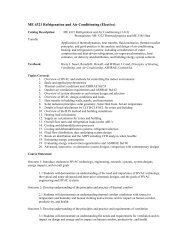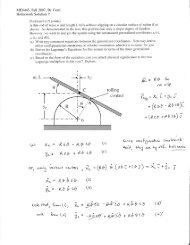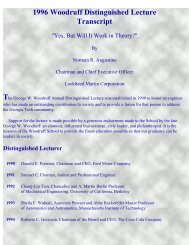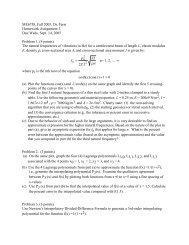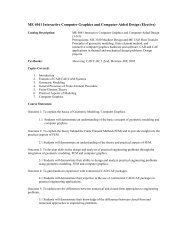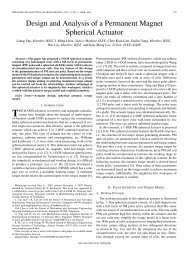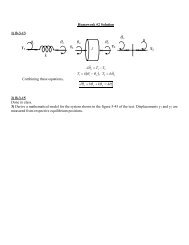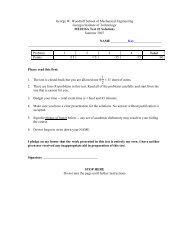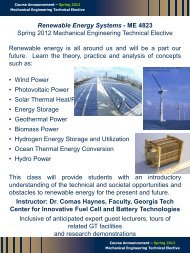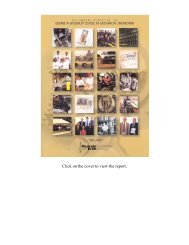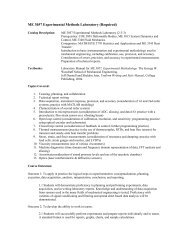ME 4215 Manufacturing Process Analysis (Elective)
ME 4215 Manufacturing Process Analysis (Elective)
ME 4215 Manufacturing Process Analysis (Elective)
You also want an ePaper? Increase the reach of your titles
YUMPU automatically turns print PDFs into web optimized ePapers that Google loves.
<strong>ME</strong> <strong>4215</strong> <strong>Manufacturing</strong> <strong>Process</strong> <strong>Analysis</strong> (<strong>Elective</strong>)<br />
Catalog Description: <strong>ME</strong> <strong>4215</strong> <strong>Manufacturing</strong> <strong>Process</strong> <strong>Analysis</strong> (3-0-3)<br />
Prerequisites: COE 3001 Mechanics of Deformable Bodies, <strong>ME</strong> 3210 Design,<br />
Materials, and Manufacture, <strong>ME</strong> 3345 Heat Transfer * .<br />
First principles based modeling and analysis of manufacturing processes. <strong>Process</strong><br />
design and optimization.<br />
Textbook:<br />
Serope Kalpakjian, Steven R. Schmid, <strong>Manufacturing</strong> <strong>Process</strong>es for Engineering<br />
Materials, 5th Edition, Prentice Hall, 2008.<br />
Topics Covered:<br />
1. Basics:<br />
1.1 Review of materials and mechanical properties<br />
1.2 Metrology and surface finish<br />
1.3 Taxonomy of manufacturing processes<br />
2. <strong>Manufacturing</strong> <strong>Process</strong> <strong>Analysis</strong>:<br />
2.1 Solidification/Molding processes: selected from<br />
i) metal casting<br />
ii) polymer and composites processing<br />
2.2 Mass conserving processes: selected from<br />
i) bulk deformation: forging, rolling, extrusion, drawing<br />
ii) sheet metal forming: bending, stretching<br />
2.3 Substractive processes: selected from<br />
i) mechanical material removal: shaping, turning, milling<br />
ii) non-mechanical material removal: EDM, ECM, Laser, EDM, WJM<br />
2.4 Additive processes: selected from<br />
i) Joining methods: welding, adhesive bonding<br />
ii) layer-by-layer manufacturing: stereolithography, direct laser melting/sintering<br />
2.5 Micro and nanomanufacturing methods: selected from photolithography, mechanical<br />
micromachining, self-assembly<br />
3. <strong>Process</strong> Design and Optimization:<br />
3.1 <strong>Process</strong> design and optimization based on cost and time<br />
Course Outcomes:<br />
Outcome 1: To teach students to perform mathematical analyses of conventional and non-traditional<br />
manufacturing processes<br />
1.1 Students will demonstrate the ability to break down manufacturing processes for analysis.<br />
1.2 Students will demonstrate the ability to identify known and unknown parameters including initial and<br />
boundary conditions for major manufacturing processes.<br />
1.3 Students will demonstrate the ability to draw free body diagrams and control volumes of select<br />
manufacturing processes.<br />
1.4 Students will demonstrate the ability to apply the fundamental principles from prerequisite courses in<br />
mechanics, materials and thermo-fluids to analyze manufacturing processes.<br />
Outcome 2: To teach students to integrate core mechanical engineering principles to design manufacturing<br />
processes<br />
2.1 Students will demonstrate the ability to integrate the relevant core principles in mechanical<br />
engineering (mechanics, materials and thermo-fluids) to solve problems in manufacturing.
2.2 Students will demonstrate the ability to carry out manufacturing process design based on first<br />
principles.<br />
Outcome 3: Students will have a basic understanding of the economic considerations underlying manufacturing<br />
process optimization<br />
3.1 Students will demonstrate an understanding of the role of economics in manufacturing process<br />
selection.<br />
3.2 Students will demonstrate the ability to perform simple cost and time based process optimization of<br />
select manufacturing processes.<br />
Correlation between Course Outcomes and Student Outcomes:<br />
<strong>ME</strong>421X<br />
<strong>ME</strong> Student Outcomes<br />
Course Outcomes a b c d e f g h i j k<br />
Course Outcome 1.1 X X X X<br />
Course Outcome 1.2 X X X X<br />
Course Outcome 1.3 X X X X<br />
Course Outcome 1.4 X X X X<br />
Course Outcome 2.1 X X X X<br />
Course Outcome 2.2 X X X X X X<br />
Course Outcome 3.1 X X X X X X<br />
Course Outcome 3.2 X X X X X<br />
GWW School of Mechanical Engineering Student Outcomes:<br />
(a) an ability to apply knowledge of mathematics, science and engineering<br />
(b) an ability to design and conduct experiments, as well as to analyze and interpret data<br />
(c) an ability to design a system, component, or process to meet desired needs within realistic constraints such as<br />
economic, environmental, social, political, ethical, health and safety, manufacturability, and sustainability<br />
(d) an ability to function on multidisciplinary teams<br />
(e) an ability to identify, formulate, and solve engineering problems<br />
(f) an understanding of professional and ethical responsibility<br />
(g) an ability to communicate effectively (3g1 orally, 3g2 written)<br />
(h) the broad education necessary to understand the impact of engineering solutions in a global, economic,<br />
environmental, and societal context<br />
(i) a recognition of the need for, and an ability to engage in life-long learning<br />
(j) a knowledge of contemporary issues<br />
(k) an ability to use the techniques, skills, and modern engineering tools necessary for engineering practice.<br />
Prepared by: Shreyes Melkote, November 2012



